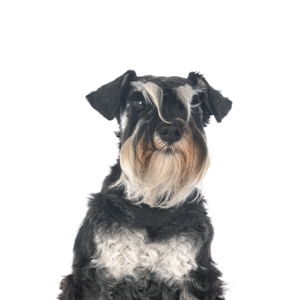
Menu

The Miniature Schnauzer
A Guide to the Miniature Schnauzer Puppy: Your New Best Friend
Thinking about bringing a Miniature Schnauzer puppy into your life? Get ready for an adventure filled with loyalty, charm, and a whole lot of personality packed into a small, sturdy package. These little dogs are known for their distinctive look, lively intelligence, and boundless energy. But what’s it really like to raise one of these feisty pups? This detailed guide will walk you through everything you need to know about the Miniature Schnauzer puppy breed.
The Miniature Schnauzer: A Quick Overview
Originating in Germany, the Miniature Schnauzer was bred to be a small farm dog, a rodent catcher, and a loyal companion. They are a “terrier” type of dog, which means they have a strong prey drive and a stubborn streak. Don’t let their small size fool you—they have a big dog’s attitude!
- Size: Small and compact, typically weighing between 11 to 20 pounds. They stand about 12 to 14 inches tall at the shoulder.
- Coat: A hallmark of the breed is their wiry outer coat and soft undercoat. This double coat needs regular grooming to prevent matting. They are often considered low-shedding, which is a big plus for many families!
- Colors: The American Kennel Club (AKC) recognizes three official colors:
- Salt and Pepper (the most common)
- Black and Silver
- Solid Black
- Distinctive Features: Their most recognizable traits are their bushy eyebrows and the classic “mustache” and beard. These features give them a wise and distinguished look.
Temperament: What to Expect from a Miniature Schnauzer Puppy
Miniature Schnauzer puppies are a bundle of energy and curiosity. They are smart, spirited, and full of life. Here’s a closer look at their personality traits:
- Intelligent and Trainable: These pups are quick learners. Their intelligence makes them excel in obedience training and dog sports. However, they can also be clever and a bit stubborn, so early and consistent training is key.
- Playful and Energetic: A Mini Schnauzer puppy loves to play. They have a high energy level and need regular exercise to stay happy and healthy. Daily walks, playtime in a fenced yard, and interactive toys are a must.
- Alert and Vocal: They are natural watchdogs. They will bark to alert you to strangers, strange noises, or anything they deem suspicious. Proper training can help manage excessive barking.
- Affectionate and Loyal: Despite their sometimes-independent nature, Miniature Schnauzers are incredibly loyal to their families. They love to be close to their people and are known for their affectionate nature. They often form a very strong bond with their primary caregiver.
Bringing Your Puppy Home: The First Few Weeks
The first few weeks with your new Miniature Schnauzer puppy are crucial for their development and for bonding with you.
- Puppy-Proofing: Get down on their level and look for anything a curious puppy might chew on or get into. Secure electrical cords, remove small objects, and put away any valuable items.
- Crate Training: Crate training is highly recommended. It provides a safe den for your puppy, helps with house training, and prevents destructive chewing. Make the crate a positive place with treats and toys.
- Socialization: The first few months are the most important for socialization. Expose your puppy to a variety of new sights, sounds, people, and other dogs. This will help them grow into a confident, well-adjusted adult dog.
- Routine: Puppies thrive on routine. Establish a consistent schedule for feeding, potty breaks, playtime, and sleep. This will help them learn what to expect and feel secure in their new home.
Health and Care for Your Miniature Schnauzer Puppy
- Grooming: Their wiry coat requires regular attention. Plan on brushing them several times a week to prevent matting. They will also need professional grooming every 4-6 weeks to get their signature schnauzer haircut.
- Exercise: As mentioned, these are active dogs. Aim for at least 30-60 minutes of exercise per day. This can be broken up into walks, games of fetch, or a run in the park. Mental stimulation through puzzle toys and training sessions is just as important.
- Diet: Feed your puppy high-quality puppy food formulated for small breeds. Follow the feeding guidelines on the bag and consult your veterinarian for advice on portion sizes.
- Common Health Issues: While generally a healthy breed, Miniature Schnauzers can be prone to certain conditions. These include:
- Pancreatitis: A serious inflammation of the pancreas.
- Bladder Stones: Uric acid stones can form in the bladder.
- Eye Problems: Such as cataracts.
- Von Willebrand’s Disease: A blood clotting disorder.
- Diabetes: The Miniature Schnauzer is more susceptible to developing diabetes than some other breeds.
FAQs
Q: Are Miniature Schnauzer puppies good with children?
A: Yes, they are generally great with children. Their playful and sturdy nature makes them excellent family dogs. However, as with any breed, you should always supervise interactions between a puppy and young children.
Q: Do they bark a lot?
A: They can be vocal. Their watchdog nature means they will alert you to anything new or suspicious. Early training can help manage this tendency.
Q: Are Miniature Schnauzers hypoallergenic?
A: While no dog is truly hypoallergenic, Miniature Schnauzers are often a good choice for people with allergies. They have a non-shedding, low-dander coat, which means they release fewer allergens into the environment.
Q: How much grooming do they need?
A: They require a significant amount of grooming. Daily or every-other-day brushing and professional grooming every 4-6 weeks are necessary to keep their coat healthy and tidy.
Q: How long do Miniature Schnauzers live?
A: The average lifespan for a Miniature Schnauzer is 12 to 15 years. With good care, they can live a long and healthy life.
Are you interested in purchasing Miniature Schnauzer puppies?
Fill out the below form and we'll get back to you as soon as possible. Thanks!